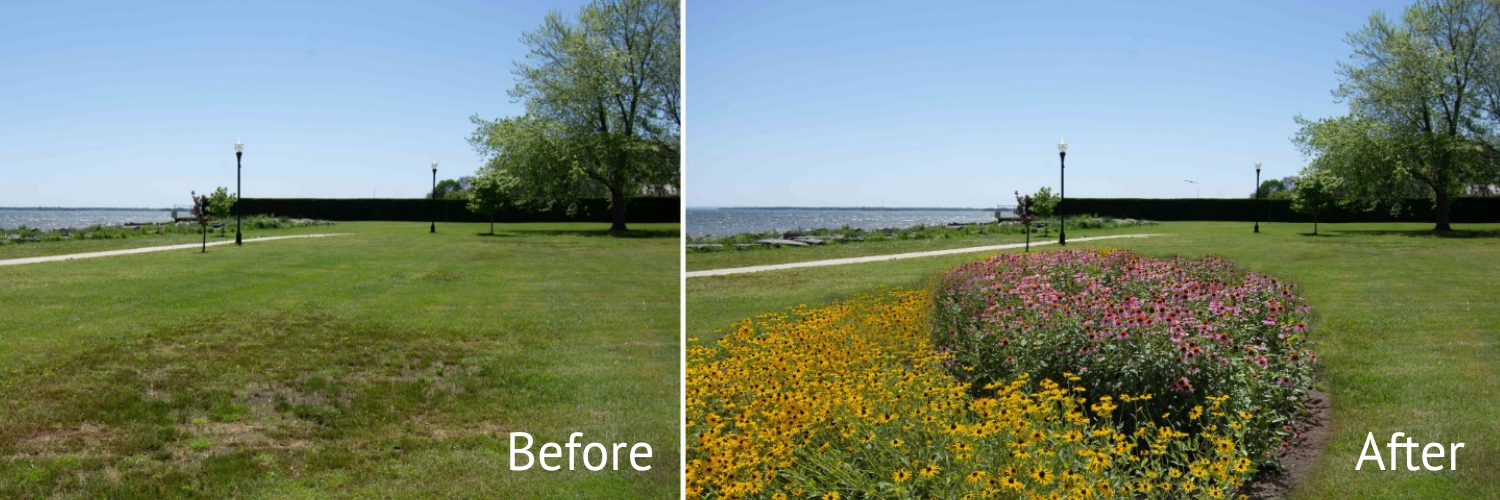Rain Garden, Dune Extension Planned for Alpena Parks
Construction will begin in September on two native plant gardens at Bay View Park, and a dune restoration project which started in 2023 at Mich-e-ke-wis Park will be extended this fall. Huron Pines partnered with the City of Alpena on both projects which support the City’s broad efforts to address stormwater runoff, improve natural habitats and protect the water quality of Lake Huron.
The public will have the opportunity to help our staff plant the gardens at Bay View Park Tuesday, Oct. 14, with a rain date of Oct. 16.
Funded by a grant from the Michigan Coastal Management Program, the suite of projects is the outcome of a community green stormwater infrastructure workshop Huron Pines hosted at the library in October 2022. At that event and through an online poll, community members were presented with examples of green infrastructure—rain gardens, planter boxes and other features for capturing stormwater runoff—and ranked their favorite proposals for sites around the city. The dune restoration and rain garden were the top-favored projects and support the City’s goals as a Lake Huron Forever Community to protect water quality.
“The rain garden and pollinator garden at Bay View Park and the dune restoration extension at Mich-e-ke-wis are not just isolated projects—they are highly visible, practical demonstrations of Alpena’s commitment to sustainable stormwater management, resilient parks, and long-term protection of Lake Huron as pledged in the City’s Lake Huron Forever roadmap,” said City Manager Rachel Smolinski.
Stormwater is rainfall and snowmelt that flows over streets, parking lots and other hard surfaces, carrying pollutants into storm drains which empty into Lake Huron. In Alpena, pollutants like excess fertilizer, animal waste and litter harm the water quality of Thunder Bay—the source of the City’s drinking water—and can result in beach closures, algae blooms, and impact fish and wildlife.
A storm drain empties into the Thunder Bay River in Alpena as a person fishes from a boat nearby.
Rain gardens are an example of green stormwater infrastructure. They use a combination of stone, soil and deep-rooted native plants to catch and filter stormwater runoff. In Alpena, rain gardens can reduce the load on underground storm sewers, prolonging the life of these systems, and contribute to cleaner drinking water. Examples of rain gardens can be found along the Bi-Path at the NOAA building in Alpena and along Michigan Avenue in Rogers City.
Two rain gardens installed in 2023 along the Bi-Path near the NOAA building in Alpena are designed to capture and filter thousands of gallons of stormwater annually.
The rain garden will occupy 1,000 square feet in a low area of Bay View Park where water gathers after heavy rain or when large waves crash over the rock breakwall. This area will be excavated down a few feet, backfilled with layers of rock and pea gravel, capped with topsoil and planted with a mix of native flowering plants which take up water from their deep roots.
“Areas that are naturally wet are the ideal place for a rain garden and that’s why this location was chosen,” said Amy Nowakowski, Senior Project Manager for Huron Pines, noting frequent standing water at the site has made mowing difficult for public works staff. “The garden will have plants that bloom throughout the growing season so it can be enjoyed by people and pollinators alike.”
A rendering of the rain garden planned for Bay View Park in Alpena.
Another 6,000 square feet of the park will be converted to a pollinator garden, providing habitat for birds and beneficial insects while serving as a community showpiece of native landscaping. Nowakowski said the gardens will initially require some watering and weeding until they become established and are self-seeding after two growing seasons.
Dunes are long, raised areas of dry sand and plants running parallel to the shoreline. Dunes store sand and replenish beaches, protect coastal areas from erosion during high water years, and serve as habitat for native plants, birds and small wildlife. Examples of healthy dune ecosystems can be found at Besser Natural Area, Negwegon State Park and Ossineke State Forest Campground.
Sand fencing installed at Mich-e-ke-wis Park in 2023 is having the intended effect of catching sand and forming dunes, and native plants have helped stabilize the sand. This project will be extended this fall along more of the beachfront, further restoring the landscape and making a shoreline that’s more resilient to erosion from wind and waves.
Native harebell wildflowers grow on the dunes taking shape at Mich-e-ke-wis Park in Alpena.
“I love this project because you can see it working almost in real time,” Nowakowski said. “It’s already helping to restore this park, and extending the project will increase those benefits and make the park easier and less costly for the City to maintain.”
Financial assistance for this project was provided to the City of Alpena by the Michigan Coastal Management Program, Water Resources Division, EGLE, with funding through the NOAA National Coastal Zone Management Program.




